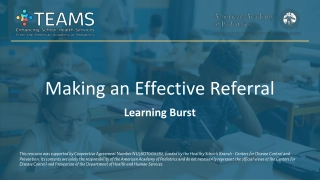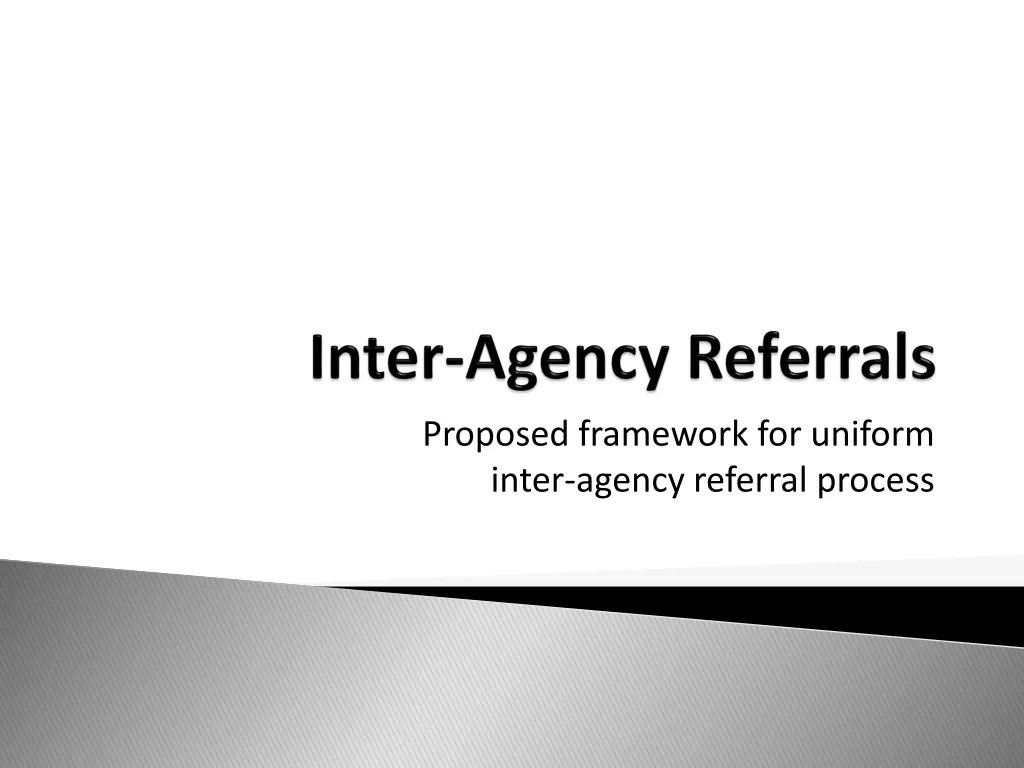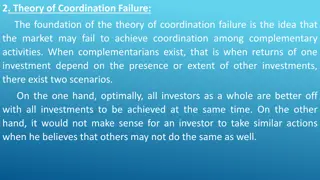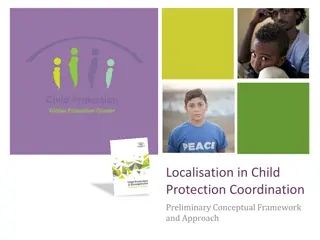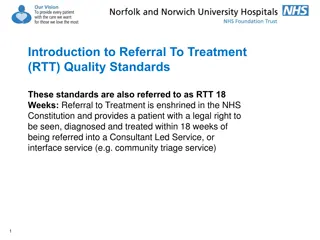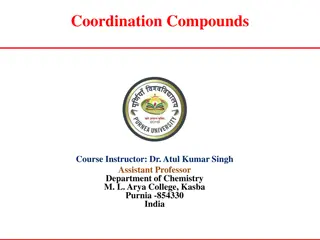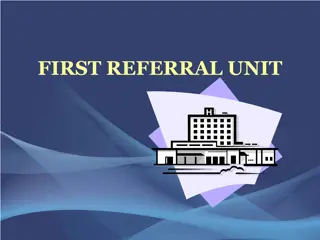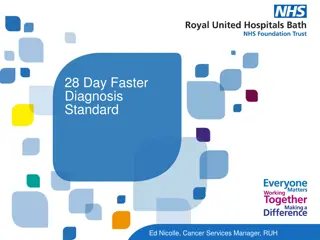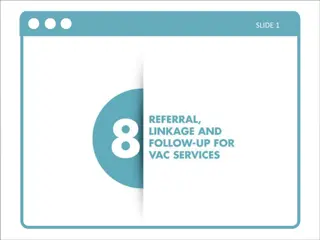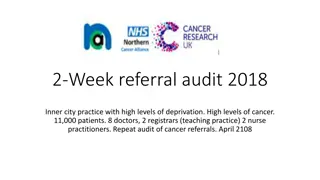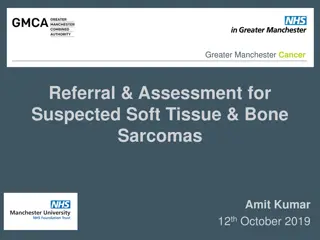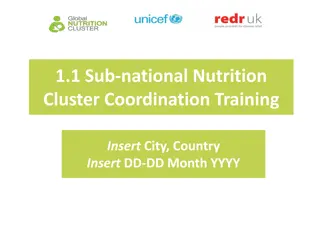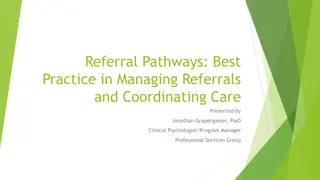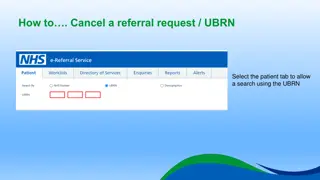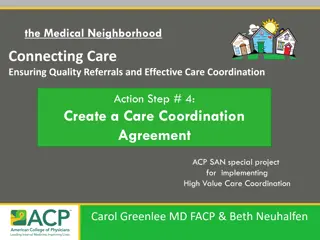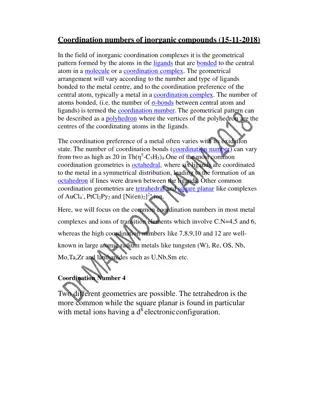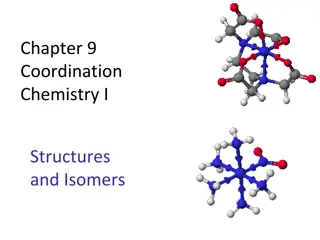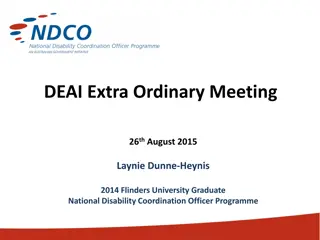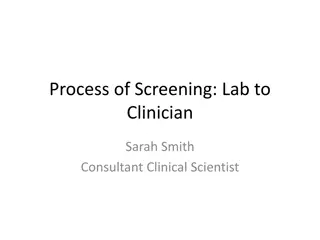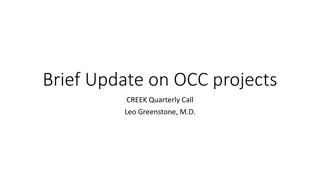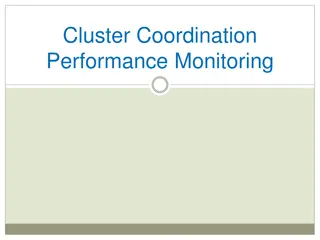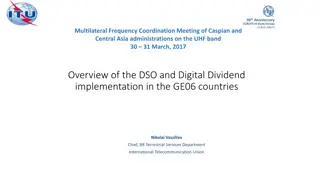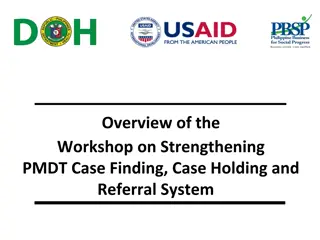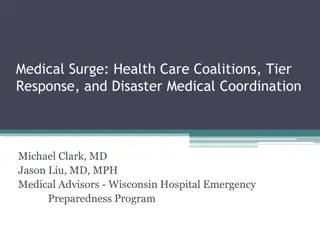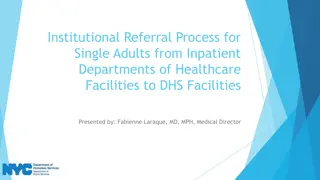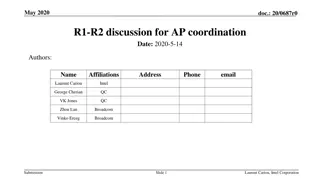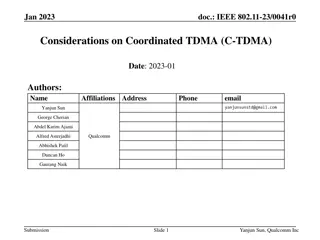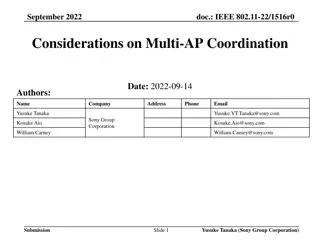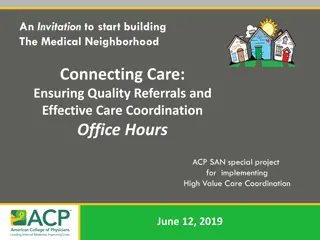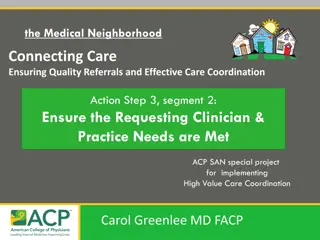Making an Effective Referral
Effective school-based referral for health services and formalizing the process. Learn to connect students to providers based on identified needs.
0 views • 19 slides
Guide to Effective Inter-Agency Referral Process
Learn about the proposed framework for a uniform inter-agency referral process aimed at directing clients to services beyond the expertise of their current provider. Understand when to make a referral, the essential steps involved, and the importance of follow-up to ensure clients receive needed ser
1 views • 18 slides
Pharmacy First Service for Uncomplicated UTIs in Women Aged 16-64 - November 2023
This pharmacy service aims to assess and treat uncomplicated urinary tract infections (UTIs) in women aged 16-64 years in community pharmacies. The service follows guidelines to promote self-care, aims to displace GP activities, and utilizes clinical skills of pharmacists for timely and appropriate
0 views • 17 slides
Introduction to Co-ordination Chemistry: Fundamentals and Applications
Explore the fascinating field of coordination chemistry, delving into the complexity of compounds and the coordination bonds that govern their structures. Discover the history, key concepts, and applications of coordination chemistry through a detailed examination of coordination compounds, bonding
13 views • 73 slides
Cinapsis - Revolutionizing Eyecare with Electronic Referral System
Cinapsis is a cutting-edge healthcare technology company offering an Electronic Eyecare Referral System (EeRS) to digitize and streamline ophthalmology referrals. Their innovative platform enhances patient care by facilitating secure communication, guidance, and referrals among eyecare professionals
5 views • 15 slides
Gaming App Referral Program | Tirangagameonline.in
Play your favorite games on Tirangagameonline.in and earn prizes by signing up for our gaming app referral program. Don't pass up the advantages and pleasure!\n\n\/\/tirangagameonline.in\/
2 views • 1 slides
Understanding the Theory of Coordination Failure in Markets
The theory of coordination failure explores how markets may struggle to achieve coordination among complementary activities, leading to suboptimal outcomes. It highlights scenarios where investors' actions depend on each other, emphasizing the role of government intervention to solve coordination is
2 views • 14 slides
Localisation in Child Protection Coordination: A Conceptual Framework
This presentation explores the preliminary conceptual framework and approach for localisation in child protection coordination. It delves into the roles of local actors, coordination systems, governance, decision-making, partnerships, and funding in promoting localisation efforts. The importance of
0 views • 22 slides
Step-by-Step Guide for Online Referral Portal in Quit Services
Access the online referral portal for quit services to refer patients effectively. Follow the detailed instructions for referral partners, including selecting the patient's state, searching for facilities and healthcare professionals, completing the referral form, and submitting it securely. Thank y
0 views • 9 slides
Understanding Referral to Treatment (RTT) Quality Standards
Referral to Treatment (RTT) Quality Standards, also known as RTT 18 Weeks, is a vital component of the NHS Constitution that guarantees patients a legal right to timely diagnosis and treatment within 18 weeks of referral. It encompasses various stages in a healthcare pathway, each assigned an RTT co
1 views • 12 slides
Understanding Coordination Compounds and Ligands in Chemistry
Coordination compounds involve ligands that donate electron pairs to central metal ions. Ligands can be categorized based on the number of donor atoms they contain, such as mono-, bi-, tri-, tetra-, penta-, and hexadentate ligands. Each type of ligand has the ability to form bonds with the central m
2 views • 15 slides
Enhancing Emergency Obstetric and Newborn Care through First Referral Units
Historical background and strategic approach to improve emergency obstetric and newborn care through the establishment of fully functional First Referral Units (FRUs) in districts, focusing on critical services, infrastructure needs, and essential facilities. The initiative aims to provide 24-hour d
0 views • 24 slides
28 Day Faster Diagnosis Standard in Cancer Services
The 28 Day Faster Diagnosis Standard focuses on timely referral to definitive diagnosis for suspected cancer patients, enabling prompt treatment initiation or providing peace of mind. Key principles include starting the clock upon receipt of referral and ending it upon diagnosis communication or tre
0 views • 7 slides
Effective Referral Process in Child Protection Programs
Understanding the importance of an effective referral process in child protection programs is crucial. It ensures rapid access to services, prevents children from falling through the cracks, and reduces stress for service providers. Criteria and principles for setting up a good referral system are o
0 views • 9 slides
Cancer Referral Audit in High-Deprivation Inner City Practice
An audit of 2-week cancer referrals in a practice with high deprivation levels and cancer prevalence among 11,000 patients. The audit shows improvements in referrals, use of regional forms, and patient information on reasons for referral. It highlights the importance of accurate referral processes i
0 views • 11 slides
Understanding Greater Manchester Cancer: Referral, Assessment & Management for Suspected Sarcomas
This content provides comprehensive information on Greater Manchester Cancer referral and assessment for suspected soft tissue and bone sarcomas. It covers objectives, background, symptoms, signs, clinical assessment, initial management, and referral criteria. Essential guidelines and key points on
0 views • 26 slides
Sub-national Nutrition Cluster Coordination Training Workshop
Welcome to the Sub-national Nutrition Cluster Coordination Training Workshop aimed at sharing key concepts, tools, and approaches for effective coordination of nutrition in emergencies. This training prepares participants for working in Nutrition Cluster/Sector Coordination, promoting dialogue and s
1 views • 10 slides
Best Practices in Referral Pathways for School-Based Mental Health Services
This presentation by Jonathan Grapengieser, a clinical psychologist and program manager, delves into the importance of effective referral pathways in managing and coordinating care for school-based mental health services. It highlights the need for streamlined processes, stakeholder involvement, and
1 views • 26 slides
How to Cancel a Referral Request Using UBRN
To cancel a referral request using UBRN, navigate to the patient tab, search using the UBRN, then on the Referral summary page, choose Cancel appointment from the Actions dropdown. Select a cancellation reason, add comments if needed, confirm the cancellation, and close the confirmation page.
0 views • 6 slides
Enhancing Care Coordination Through Agreements
Effective care coordination is crucial for ensuring quality referrals and improving patient outcomes. Develop a Care Coordination Agreement to streamline the referral process, reduce waste, and enhance cost-effectiveness in healthcare delivery. This agreement serves as a roadmap for standardizing co
0 views • 49 slides
Coordination Numbers in Inorganic Compounds: Geometries and Structures
In inorganic coordination complexes, the coordination number refers to the number of atoms bonded to the central atom. Common geometries include octahedral, tetrahedral, and square planar, depending on the type and number of ligands. Transition metal complexes exhibit different coordination numbers
2 views • 8 slides
Understanding Coordination Chemistry: Structures, Isomers, and Naming
Exploring coordination chemistry involves understanding structures, isomers, naming conventions, and common coordination numbers, all essential in studying coordination compounds. Coordination compounds consist of central metals, ligands, and charge balancing ions. Naming involves listing cations, l
0 views • 46 slides
Enhancing Student Referral Process in College Counseling Centers
Exploring strategies to improve the referral process from college counseling centers to community providers for more effective student support. Topics include challenges of off-campus referrals, referral coordination programs, assessment models, and best practices. The program involves 30-minute ses
0 views • 12 slides
Understanding the National Disability Coordination Officer (NDCO) Programme
The National Disability Coordination Officer (NDCO) Programme aims to improve education and employment outcomes for individuals with disabilities across Australia. It operates through 31 service regions, providing information, coordination, and referral services for post-school education and trainin
0 views • 30 slides
Efficient Baby Screening and Referral Process Overview
Detailed overview of the screening process from sample collection to clinician consultation, including timelines, referral pathways, and confirmation procedures for preterm babies. Lab turnaround times, repeat sample guidelines, and referral process details are also covered.
0 views • 19 slides
Update on OCC Projects: Focusing on Access, Timeliness, Care Coordination, Quality of Care, Cost, and Governance
OCC is focusing on key areas including improving access for Veterans, enhancing timeliness of care referrals, integrating care coordination tools, ensuring quality of care through safety guides, managing costs efficiently, and enhancing data governance with Cerner. Various initiatives are underway t
0 views • 8 slides
Understanding Cluster Coordination Performance Monitoring (CCPM)
The Cluster Coordination Performance Monitoring (CCPM) is a self-assessment tool that helps evaluate cluster performance against core functions and Accountability to Affected Populations. It aims to improve coordination and accountability within clusters, developed by the IASC Sub-Working Group. Mon
0 views • 16 slides
Understanding Coordination Complexes and Transition Metals
Today's lecture covers transition elements, coordination complexes, ligand types, geometries, naming, isomers, and bonding in coordination complexes. Transition metals form coordination complexes with metal ions, ligands, and counter ions. The types of ligands include monodentate and bidentate ligan
0 views • 24 slides
Overview of Multilateral Frequency Coordination Meeting for Digital Dividend Implementation
The Multilateral Frequency Coordination Meeting discussed progress in implementing digital switchover and digital dividend in the GE06 countries. It highlighted the allocation of spectrum for mobile services and the importance of coordinated implementation. Various coordination groups in Region 1 wo
0 views • 14 slides
Strengthening PMDT Case Finding Workshop Overview
In the Workshop on Strengthening PMDT Case Finding, Case Holding, and Referral System, the focus is on improving the management of MDR-TB cases to prevent transmission, XDR-TB development, and deaths. The program aims to enhance the detection and quality care of MDR-TB cases, ensuring treatment comp
0 views • 10 slides
Enhancing Healthcare Emergency Preparedness and Response in Wisconsin
The Wisconsin Hospital Emergency Preparedness Program (WHEPP) focuses on supporting hospitals in planning and responding to mass casualty incidents and pandemics. It emphasizes the importance of healthcare coalitions, tier coordination, and disaster medical coordination centers. The program, funded
0 views • 30 slides
Institutional Referral Process for Single Adults from Inpatient Departments to DHS Facilities
This presentation outlines the institutional referral process for single adults from inpatient departments of healthcare facilities to DHS facilities, focusing on screening referrals, coordinating care for medically appropriate individuals, and improving health outcomes. It covers goals, the shelter
0 views • 51 slides
Proposal for Release 1/R2 Feature Split in Wireless AP Coordination
The proposal suggests modifying the split between Release 1 and Release 2 features for wireless AP coordination in order to address the lack of consensus on the low complexity AP coordination feature. It aims to enhance clarity and efficiency in the development process while maintaining the value of
0 views • 7 slides
Enhancing AP Coordination for Improved Wireless Network Performance
This document discusses considerations for Coordinated TDMA (C-TDMA) in IEEE 802.11 networks to address issues of limited coordination among Access Points (APs). The objective is to enhance coordination among APs to improve network reliability in terms of latency, throughput, and fairness. Design pr
0 views • 14 slides
IEEE 802.11-22/1516r0 AP Coordination Considerations
Review of discussions on AP coordination in WNG sessions and EHT SG/TGbe meetings, proposing advancements for future WLAN technology. Emphasis on the importance of prioritizing AP coordination to address various WLAN objectives effectively. Details on AP coordination subtypes and their impact on rel
0 views • 11 slides
Distributed Coordination Algorithms for Robotic Swarms: Challenges and Innovations
Explore the world of robotic swarms through the lens of distributed coordination algorithms. Discover various coordination tasks, synchronization models, and algorithm results, alongside the evolution of robot models for enhanced efficiency. Delve into coordinated movement, flocking behaviors, and t
0 views • 10 slides
Enhancing Care Coordination: A Path to Improving Referrals and Closing the Loop
Explore the journey towards building a cohesive medical neighborhood for effective care coordination. Uncover prevalent challenges in referral processes, the importance of closing the loop, and the impact of referral tracking on reducing incomplete referrals and enhancing patient outcomes.
0 views • 22 slides
Enhancing Care Coordination for Improved Patient Referral Experiences
Explore the importance of patient-centered referral experiences, highlighting the impact of effective care coordination on patient outcomes. Contrasting cases illustrate the difference between non-patient-centered and patient-centered referral processes. Learn actionable steps to ensure all stakehol
0 views • 52 slides
Enhancing Care Coordination in the Medical Neighborhood
This content emphasizes the importance of ensuring high-value care coordination through effective referral processes and close-loop tracking in the medical neighborhood. It discusses key action steps, such as developing care coordination agreements and providing a high-value referral response. Furth
0 views • 26 slides
Submarine Cable Resiliency Update and Recommendations
Working Group 4A provides updates on the status of submarine cable resiliency, highlighting the risks to infrastructure due to lack of coordination across agencies and clustering of cable routes. The group aims to enhance regulatory coordination and promote geographic diversity to ensure network res
0 views • 7 slides
